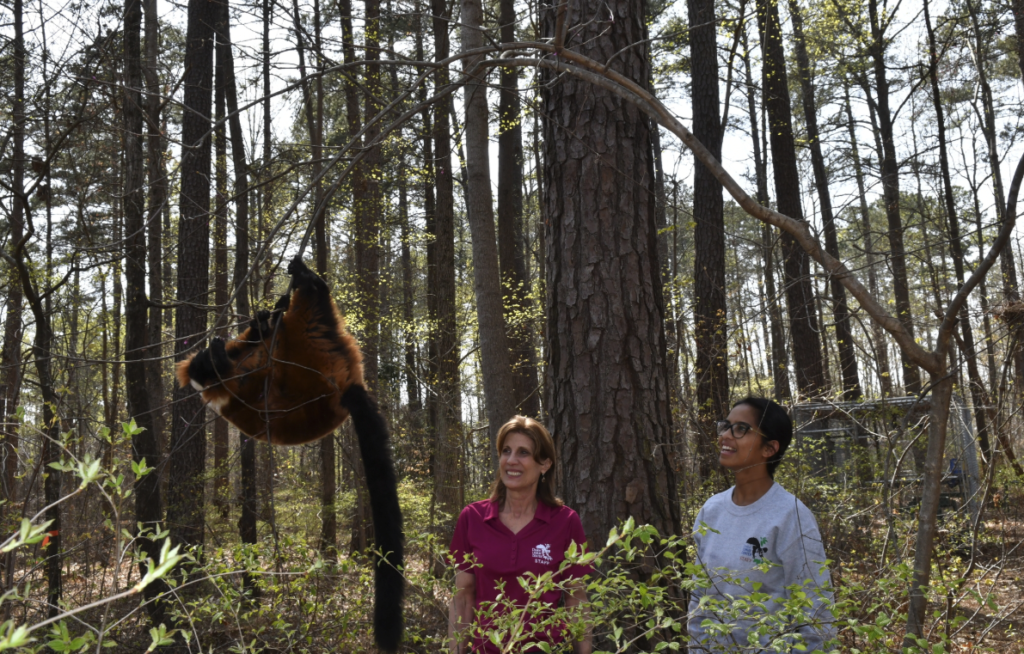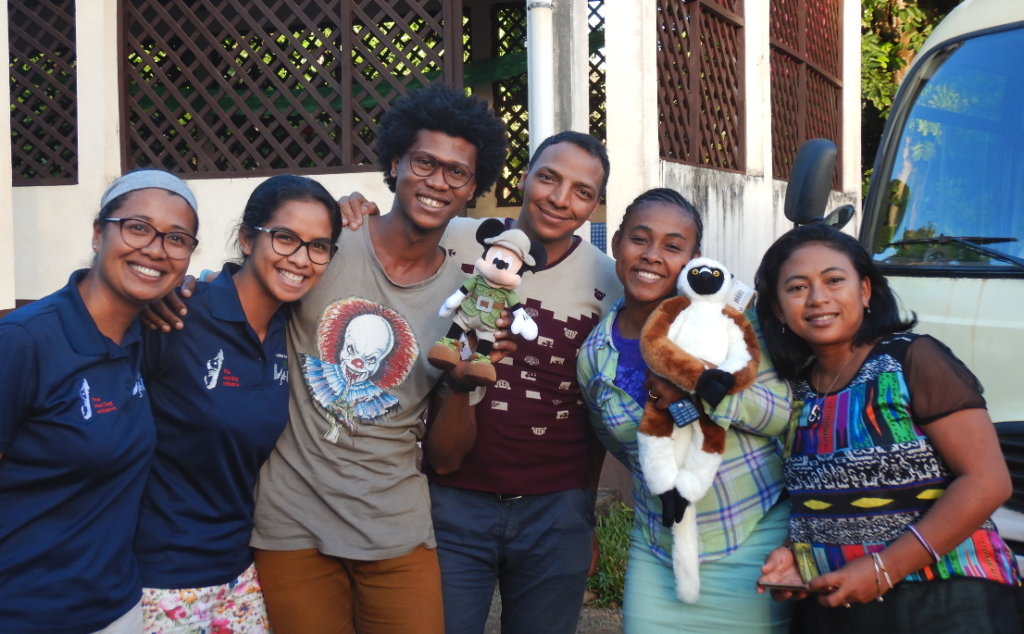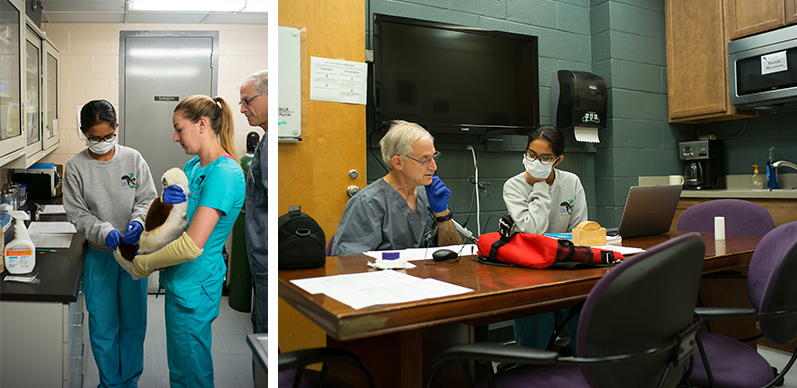By Vanessa Moss, Duke Research Communications Intern
and Andrea Katz

Malagasy veterinarian Dr. Tsiky Rajaonarivelo with the DLC’s curator, Dr. Cathy Williams, and red ruffed lemur Buzz. This spring, the DLC hosted Tsiky for three months of intensive training in lemur veterinary medicine. Photo by David Haring.
The launch of three brand-new training programs
The DLC’s bond with Madagascar has grown even stronger this year with the launch of three training programs that promise to improve lemur care and welfare in both the lemurs’ native and adoptive homes.
This spring, through our first-ever collaboration with Mad Dog Initiative (MDI), the Duke Lemur Center hosted Malagasy veterinarian Dr. Tsiky Rajaonarivelo in Durham for three months of intensive training in lemur veterinary medicine.
And this fall, the DLC’s own primate technician of 15 years, Bevan Clark, will be leaving for a 10-month stay at Parc Ivoloina in eastern Madagascar. There she’ll train staff of Madagascar’s zoos on husbandry, health monitoring, and breeding and birth season management techniques for captive lemurs.
Bevan will help oversee the on-the-ground implementation of our third training initiative: a comprehensive lemur care manual compiled by DLC conservationist Andrea Katz, who lived in Madagascar for 15 years and managed the DLC colony from 2006-2018. The manual, which was created in partnership with the Government of Madagascar, will help advance lemur care and welfare in zoos across the island.
Bevan’s trip to Madagascar is the biggest project the DLC has ever assigned to a technician. “We’ve never had a tech project of this magnitude or duration,” says DLC executive director Greg Dye, adding: “The most tangible thing we can do for lemur care in Madagascar is to send one of our staff there or bring a veterinarian here. The zoos and conservation programs in Madagascar have hearts as big as ours, but their funds and resources are just a fraction of what we have access to.”
Advancing lemur care and management in Madagascar

Workshop participants included Malagasy veterinarians and representatives from local zoos and conservation organizations – nearly 40 people in total. (With special guests “safari Mickey” from Disney and “Rupert” from DLC!) Photo by Tom Schopler.
At the invitation of the Government of Madagascar’s Ministry of the Environment (MinEnv), four DLC staff members – conservationist Andrea Katz, veterinarian Bobby Schopler, animal care supervisor Britt Keith, and data manager Sarah Zehr – travelled to Madagascar in June to conduct a workshop on lemur care and management in Madagascar’s zoos and wildlife parks.
Held at Parc Ivoloina and co-hosted by the Madagascar Fauna and Flora Group (MFG), the workshop celebrated the new Lemur Care and Management Manual created by the DLC in collaboration with Malagasy colleagues. With chapters on breeding and social management, housing and enrichment, veterinary care and nutrition, animal records, zoo ethics, and wildlife laws, the new manual (in French) will serve as an official MinEnv document and advance standards of lemur care at zoos throughout Madagascar.
Over 30 representatives from the MinEnv, local conservation associations, and Malagasy zoos – including veterinarians, animal managers, and keepers – participated in the workshop. The manual was reviewed by the workshop’s participants, whose input will be incorporated into the upcoming final version.
In addition to presentations by Andrea, Bobby, Britt, and Sarah, Dave Morgan of Wild Welfare spoke about modern concepts of animal welfare and ethics. MinEnv staff led sessions on wildlife laws and the government’s goals to expand oversight of captive lemur facilities and cooperative breeding programs, and the group discussed the creation of a Madagascar Zoo Association to support these goals into the future. DLC staff is excited about next steps and the opportunities to grow our partnerships to benefit both ex situ and in situ lemur conservation in Madagascar.
New internship brings Malagasy veterinarians to the DLC for additional medical training

LEFT: Tsiky administers a routine injection to Justa, a Coquerel’s sifaka, with the assistance of vet tech Megan Davison. Supervising veterinarian Bobby Schopler looks on. RIGHT: Bobby and Tsiky consult before a procedure. Photos by Sara Clark.
Tsiky’s arrival at the Duke Lemur Center in March 2019 heralded the beginning of an annual internship for Malagasy vets, which DLC veterinarian Bobby Schopler has been working on arranging for years. Offered in collaboration with MDI, the veterinary exchange program blends two organizations with the same shared vision for conservation work. MDI assesses the impact of feral dogs on native Malagasy wildlife, including lemurs, and provides training for veterinary students and graduated veterinarians from the University of Antananarivo.
“Madagascar runs on relationships,” says the DLC’s curator, Cathy Williams. A longtime veterinarian with extensive experience working in Madagascar, Cathy understands clearly why Bevan’s extended stay is so valuable and how Tsiky’s training has the capacity for huge positive change. “If any veterinarian is going to have a positive impact, it’s going to be a Malagasy vet,” she says. “They understand the culture and unique challenges and provide more continuity than any visiting foreign vet ever could.”
Veterinary training in Madagascar is based more on theory than practice. “We have five years in theory, and in the last year you do your thesis,” says Tsiky. “In my time, we didn’t have as much practical training on animals. We learn about animal medicine and practice on humans in the beginning, but we don’t really have a chance to practice on animals.”
Cathy first worked with Tsiky on a project in 2012, when Tsiky was in her final year of vet school. At that time, she hadn’t ever conducted a physical exam on a lemur, used a stethoscope, or recorded data in the field.
After her time at the DLC, Tsiky now has the skills to treat lemurs brought to her clinic from the pet trade. “Sometimes we encounter pet lemurs that people want to give to us because they don’t know where to keep them,” says Tsiky. “So, I will be able to take proper care of them and share my knowledge with my colleagues in zoos.”
She is one of only five veterinarians island-wide who are known to treat lemurs, and her connection to the Duke Lemur Center makes her a major source of lemur-related veterinary knowledge in Madagascar.
International exchange opportunities like Tsiky’s, Bevan’s, and the Lemur Care and Management Manual offer new approaches to lemur care and conservation, benefitting lemurs around the world. By providing instruction to Malagasy veterinarians and guidance for zoos, we provide better care for captive lemurs in Madagascar, which leads to a better global breeding population, and better likelihood for species survival.
“But the greatest benefit from having Tsiky here,” Greg says, “is understanding the amount of passion and determination she has for protecting Madagascar’s natural resources. You see the drive of professionals like Tsiky, and you know: If the future of Madagascar is in hands like hers, it’s in very good hands.”
Thank you, donors!
Bevan’s and Tsiky’s programs were made possible by the generosity of individual donors. Andrea’s lemur care manual and workshop were supported by a grant to the DLC from the Disney Conservation Fund and the Conservation Grants Funds of the Association of Zoos & Aquariums (AZA). Duke University alumni Drs. Elisabeth and Russel Cook provided key support for DLC staff members’ travel to Madagascar in June.
100% of funding for the DLC’s Madagascar conservation programs comes from private donations and grants. Please consider making a tax-deductible donation today!
For more information, please contact:
Sara Clark
Director of Communications, Duke Lemur Center
919.401.7251
sara.clark@duke.edu

